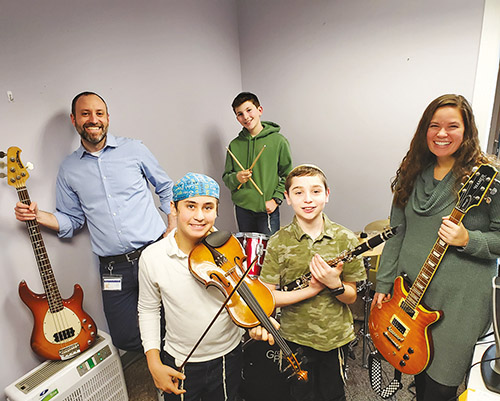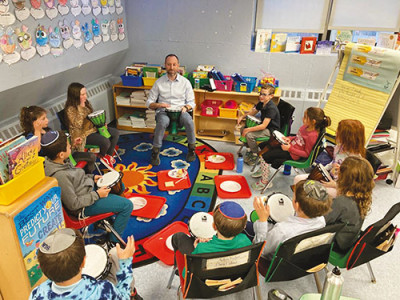

Music has been wafting through the halls of Westchester Day School this year, bringing the joy of holidays and general good vibes to students and faculty alike. At the center of this movement is the Sixth Grade Band, a weekly elective that has already performed for the school for Chanukah and Purim. They practice every Tuesday, and anyone in the vicinity of the middle school’s second floor cannot help but dance to the rhythm.
Contributing to a joyous atmosphere is but one way music has been making an impact at WDS. Musical opportunities offer the students ways to connect with each other and with faculty—expanding these relationships and deepening mutual appreciation. Students can develop and showcase talents that might otherwise go unnoticed, and the impact this can have on their social-emotional development is profound. Further, when students have a forum to engage in creative pursuits in a school setting, educators have additional opportunities to learn about students’ unique ways of thinking, feeling and communicating. This can help educators appreciate the whole child and guide them towards tailored instruction for diverse learners.
WDS has also introduced the Lunch and Learn Drum Circle, a weekly program for kindergarten through fourth grade, in which students learn to drum together— and so much more. Skills such as attention and focus, the ability to inhibit an impulse and general ability to self-regulate are key. Afterall, art is just as much (or more?) the space between the colors or the sounds as it is the visible and audible aspects. Being able to refrain from striking the drum is a critical skill that has clear analogues in social-emotional functioning and is critical to the art/music of living.
All of that is relevant when you are playing alone; Add in the element of playing music with others and the result is a social-emotional wonderland! The most apparent aspect here is the coordination and cooperation required; the degree to which the students cooperate will determine the quality of the music. But beyond that, students learn to make time and space for their peers. For example, at times, each participant will take a turn improvising while the others maintain the basic beat. This exercise requires a stance of respect and openness to one’s peer and a posture of “I’m so curious to hear what you have to say!” Beyond that, as the other students are engaged in playing the basic beat, they are also actively supporting the improviser’s self-expression, as if to say, “We’ve got your back! Feel free to be yourself here; You’ve got our support.”
Of course, all of that is left unspoken. For the students with the drums under their fingers, the experience is pure fun and excitement. The exhilaration on their faces when they successfully lock-in to the rhythm or improvise for the first time is priceless.











